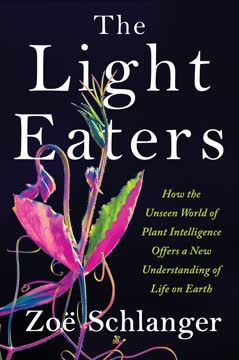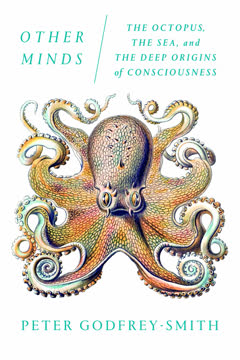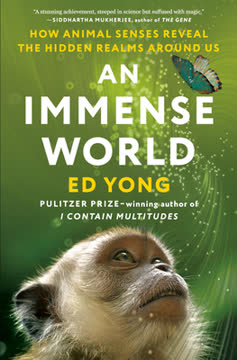Key Takeaways
1. Fungi: The Hidden Kingdom Shaping Life on Earth
Fungi are everywhere but they are easy to miss. They are inside you and around you. They sustain you and all that you depend on.
Ubiquitous and essential. Fungi form one of life's kingdoms, as broad and diverse as animals or plants. They range from microscopic yeasts to vast networks of honey fungi, with some individual organisms spanning kilometers and weighing hundreds of tons. Fungi play crucial roles in ecosystems:
- Decomposers: Breaking down organic matter and recycling nutrients
- Symbionts: Forming essential partnerships with plants and animals
- Pathogens: Causing diseases in plants and animals
- Nutrient transporters: Moving resources through ecosystems
Historical impact. Fungi have shaped Earth's history in profound ways:
- Enabling plants to colonize land over 500 million years ago
- Forming coal deposits by resisting decomposition in the Carboniferous period
- Influencing climate through their role in carbon cycling
2. Mycorrhizal Networks: Nature's Underground Internet
Mycelium is ecological connective tissue, the living seam by which much of the world is stitched into relation.
The wood wide web. Mycorrhizal fungi form vast underground networks, connecting plants and facilitating the exchange of nutrients and information. This symbiotic relationship is fundamental to plant life:
- Over 90% of land plants depend on mycorrhizal fungi
- Fungi provide plants with water and nutrients in exchange for sugars
- Networks can link different species of plants, allowing resource sharing
Beyond nutrition. Mycorrhizal networks serve multiple functions in ecosystems:
- Warning systems: Plants can send chemical signals about pests or diseases through fungal networks
- Carbon storage: Fungi lock significant amounts of carbon in soil
- Soil structure: Mycelium acts as a living mesh, preventing erosion
3. Lichens: Pioneers of Symbiosis and Survival
Lichens are a triumph and a thing of vast beauty.
Nature's extremophiles. Lichens are composite organisms, typically consisting of fungi and algae or cyanobacteria living in symbiosis. They are renowned for their ability to survive in extreme conditions:
- First organisms to colonize bare rock
- Can survive in space, enduring intense radiation and temperature fluctuations
- Some of the longest-living organisms, with individuals over 5,000 years old
Ecological importance:
- Soil formation: Breaking down rock and contributing to the first stages of soil development
- Air quality indicators: Sensitive to pollution, used to monitor environmental health
- Biodiversity: Providing habitat and food for various organisms
4. Fungal Intelligence: Problem-Solving Without a Brain
Fungi are metabolic wizards and can explore, scavenge, and salvage ingeniously, their abilities rivaled only by bacteria.
Adaptive problem-solvers. Despite lacking a centralized nervous system, fungi display remarkable problem-solving abilities:
- Maze navigation: Fungi can find the most efficient path through complex labyrinths
- Resource allocation: Mycelial networks can optimize nutrient distribution
- Memory: Some fungi appear to "remember" and learn from past experiences
Electrical signaling. Recent research suggests fungi may use electrical impulses to communicate within their networks, analogous to animal nervous systems:
- Action potential-like spikes observed in some fungal species
- Potential for rapid information transfer across large mycelial networks
- Implications for understanding fungal behavior and ecology
5. Psychedelic Fungi: Altering Minds and Cultures
Fungi might make mushrooms, but first they must unmake something else.
Chemical innovators. Some fungi produce powerful psychoactive compounds, most notably psilocybin:
- Potential therapeutic applications: Treatment for depression, anxiety, and addiction
- Cultural significance: Used in traditional spiritual practices for thousands of years
- Neurological effects: Altering brain connectivity and potentially promoting neuroplasticity
Historical impact:
- Theorized role in human cognitive evolution (the "stoned ape" hypothesis)
- Influence on art, music, and counterculture movements
- Ongoing research into potential medical and psychological benefits
6. Radical Mycology: Fungal Solutions for Global Challenges
Fungi have persisted through Earth's five major extinction events, each of which eliminated between seventy-five and ninety-five percent of species on the planet.
Environmental remediation. Fungi show promise in addressing various environmental issues:
- Mycoremediation: Using fungi to break down pollutants and clean contaminated sites
- Plastic degradation: Some fungi can digest certain types of plastic
- Oil spill cleanup: Fungi capable of breaking down hydrocarbons
Sustainable materials:
- Mycelium-based materials as alternatives to plastics and leather
- Fungal insulation and building materials
- Potential for "growing" structures rather than building them
7. Redefining Life: Lessons from the Fungal World
We are ecosystems that span boundaries and transgress categories. Our selves emerge from a complex tangle of relationships only now becoming known.
Blurring boundaries. Fungi challenge our understanding of individuality and the nature of life:
- Symbiosis as a fundamental aspect of life, not an exception
- Networks and relationships as key to understanding organisms
- Questioning the concept of discrete individuals in biology
Implications for human understanding:
- Rethinking human individuality in light of our microbiome
- Considering ecosystems and networks as units of life and evolution
- Potential for new approaches to medicine, ecology, and environmental management based on fungal models
Last updated:
FAQ
What's Entangled Life about?
- Exploration of Fungi's Role: Entangled Life by Merlin Sheldrake explores the hidden and intricate world of fungi, emphasizing their crucial role in ecosystems and their influence on life on Earth.
- Interconnectedness of Life: The book illustrates the complex relationships between fungi, plants, and animals, challenging traditional views of individuality and highlighting life's web of interactions.
- Scientific and Personal Journey: Sheldrake combines scientific research with personal experiences, making the narrative both informative and engaging, inviting readers to rethink their understanding of life.
Why should I read Entangled Life?
- Unique Perspective on Nature: The book offers a fresh perspective on the natural world, focusing on the often-overlooked role of fungi in ecosystems.
- Relevance to Current Issues: Understanding fungi's roles can provide insights into ecological health and sustainability, relevant in the context of environmental challenges like climate change.
- Mind-Expanding Ideas: Sheldrake encourages readers to rethink assumptions about life and individuality, promoting a holistic view of ecosystems and inspiring appreciation for interconnectedness.
What are the key takeaways of Entangled Life?
- Fungi as Ecosystem Engineers: Fungi play a vital role in nutrient cycling and soil health, acting as "ecosystem engineers" that shape their environments.
- Interdependence of Life Forms: The book emphasizes that no organism exists in isolation; life is a tapestry of relationships, challenging the notion of individualism in biology.
- Potential for Radical Change: Understanding fungi can lead to innovative solutions for environmental issues, offering promising avenues for ecological restoration.
What are the best quotes from Entangled Life and what do they mean?
- “Fungi are everywhere but they are easy to miss.”: Highlights the omnipresence of fungi, often unnoticed despite their critical roles, reminding us to pay attention to nature's hidden aspects.
- “Without this fungal web my tree would not exist.”: Emphasizes fungi's essential role in supporting plant life, illustrating the interconnectedness theme.
- “We are all lichens.”: Explores symbiosis and the blending of identities among organisms, suggesting humans are composite beings shaped by relationships.
How do fungi influence ecosystems according to Entangled Life?
- Nutrient Cycling: Fungi decompose organic matter, returning nutrients to the soil, crucial for maintaining soil fertility and supporting plant growth.
- Mycorrhizal Networks: Fungi form associations with plant roots, facilitating nutrient exchange and communication, enhancing plant resilience and ecosystem stability.
- Impact on Biodiversity: Fungi influence plant diversity by determining which species thrive, shaping community dynamics and ecosystem health.
What is the "Wood Wide Web" mentioned in Entangled Life?
- Definition of the Concept: The "Wood Wide Web" refers to interconnected mycorrhizal networks formed by fungi that link trees and plants, facilitating communication and nutrient exchange.
- Functionality: Through these networks, plants share resources and send distress signals, enhancing survival and forest health.
- Ecological Implications: Challenges traditional views of competition among plants, suggesting cooperation plays a significant role in forest ecosystems.
What is mycoremediation as discussed in Entangled Life?
- Definition of Mycoremediation: Mycoremediation uses fungi to degrade or remove environmental pollutants from soil and water, leveraging fungi's natural decomposition abilities.
- Fungi's Decomposition Abilities: Fungi can degrade a wide range of pollutants, including pesticides and plastics, enhancing decomposition through mycelial networks.
- Challenges in Implementation: Practical application faces challenges like ensuring the right conditions for fungal growth, with success depending on specific fungal strains and adaptability.
How do fungi communicate with plants and each other?
- Chemical Signaling: Fungi and plants exchange chemical signals for nutrient transfer and environmental alerts, essential for maintaining health.
- Electrical Impulses: Some fungi conduct electrical signals through mycelial networks, coordinating responses to stimuli like nutrients or threats.
- Shared Networks: Fungi connect multiple plants, enabling communal responses to challenges, fostering resilience within plant communities.
What is mycorrhizal fungi and why are they important?
- Definition: Mycorrhizal fungi form symbiotic relationships with plant roots, enhancing nutrient uptake while receiving carbohydrates, crucial for plant health.
- Nutrient Acquisition: Help plants access essential nutrients like phosphorus and nitrogen, vital for survival in nutrient-poor soils.
- Ecosystem Stability: Contribute to soil structure and health, promoting water retention and reducing erosion, enhancing ecosystem resilience.
How do fungi contribute to human health and medicine?
- Medicinal Properties: Fungi have been used in traditional medicine and modern research confirms their potential in treating ailments, with compounds like penicillin revolutionizing medicine.
- Psychoactive Effects: Certain fungi, like psilocybin mushrooms, show promise in treating mental health conditions, inducing profound psychological experiences.
- Nutritional Benefits: Fungi provide essential nutrients, vitamins, and antioxidants, contributing to overall well-being when incorporated into diets.
How does Entangled Life address the relationship between fungi and humans?
- Cultural Significance: Explores fungi's historical and cultural significance, from traditional medicine to culinary practices, shaping human culture.
- Psychoactive Properties: Discusses psychoactive fungi in spiritual and therapeutic contexts, highlighting their potential to alter consciousness and promote healing.
- Environmental Stewardship: Advocates for a respectful and sustainable relationship with fungi, recognizing their ecological importance and calling for a shift in interaction with nature.
How does Entangled Life redefine our understanding of ecosystems?
- Interconnectedness of Life: Emphasizes the interconnectedness of organisms through fungal networks, encouraging a holistic view of ecosystems.
- Role of Fungi: Portrays fungi as essential players in nutrient cycling and plant health, challenging the view of them as mere decomposers.
- Implications for Conservation: Understanding fungi's role can inform conservation efforts, leading to effective strategies for preserving biodiversity and ecosystem health.
Review Summary
Entangled Life receives high praise for its fascinating exploration of fungi. Readers appreciate Sheldrake's engaging writing style, enthusiasm, and ability to make complex concepts accessible. The book offers insights into fungi's role in ecosystems, their intelligence, and potential applications. Many reviewers express awe at the unexpected aspects of fungal biology and behavior. Some critics find the philosophical musings excessive, but most agree the book is enlightening and thought-provoking. Overall, it's considered a captivating read that changes perspectives on the natural world.
Similar Books






Download PDF
Download EPUB
.epub digital book format is ideal for reading ebooks on phones, tablets, and e-readers.




